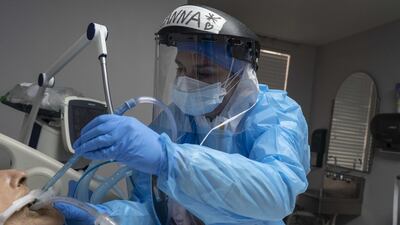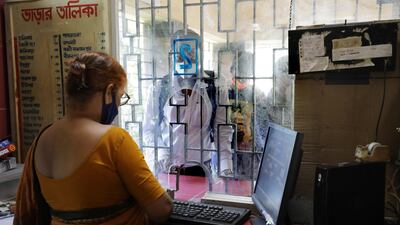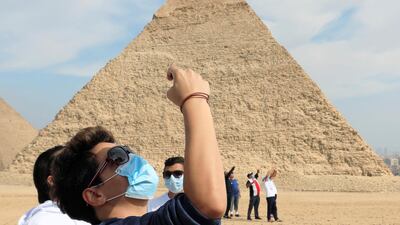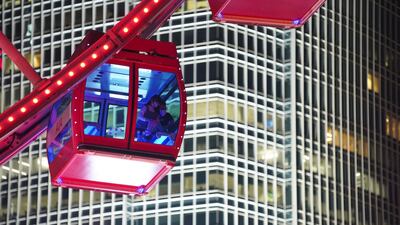Tunisia’s Covid-19 death toll is expected to more than triple before an effective vaccine is widely available, Prime Minister Hichem Mechichi said.
On Monday evening, Mr Mechichi said the government would increase efforts to enforce existing measures to control the virus. He said deaths could climb to between 6,000 and 7,000. The government has already brought in a nightly curfew, a ban on travel between governorates and, principally, is policing the rules on mask-wearing that the government said is vital in slowing the spread of the virus.
So far, there have been more than 72,000 confirmed cases of coronavirus in Tunisia, resulting in more than 2,000 deaths. But with testing limited, the true extent of the spread may be far higher.
Political analyst and head of the Columbia Centre in Tunis, Youssef Cherif, said he has so far lost three friends to the virus.
"I think its spread across the country, from what I can see around me. It's affecting older people most, and it's still early to assess the government measures," he told The National.
The Tunisian government has made mask wearing a critical component of its countermeasures. According to the international estimates cited heavily by Tunisian officials, at least 80 per cent of the public must be wearing masks to start reversing the spread of the infection. On November 9, the government estimated adherence to mask-wearing was about 40 per cent.
"The issue is that many people do not believe in science and refuse to wear masks for longer periods of time," Mr Cherif said. "Young people still meet in groups. Public administrations are open, public transport is crowded."
If the government cannot bring the numbers down, Mr Cherif said, it will have to increase restrictions even if that further damages the already fragile economy.
"In my opinion, sooner or later they'll have to establish a total lockdown, even if that's very unpopular. I don't know why they didn't start the requisition process, the situation is already alarming. It's perhaps the strong lobbies, perhaps the limited means of coercion," he said.
Covid-19 around the world - In pictures
Another lockdown will inevitably prove an expensive measure. Tunisia estimates that coronavirus has already cost the heavily indebted country $2.9 billion. A further shutdown will only increase the strain on the economy and push many of those already at risk from hunger to the brink.
Across the country, public hospitals are at risk of being overwhelmed.
Coronavirus patients in the coastal city of Bizerte, about 40 minutes north of the capital, are already at critical risk because intense competition for limited beds is causing perilous delays in treatment, inevitably contributing to further fatalities.
"I see reports suggesting that up to 250 people are being admitted to ICU every day. So, if we're not at capacity, we will be shortly," said Dr Amine Ghrabi, who co-authored a report on public health responses in Tunisia before the virus's first wave. The country is believed to have only 181 regular ICU beds at normal times.
"It's not just equipment and facilities, doctors, especially anaesthesiologists, are already in short supply," he said, referring to the country’s years-long brain drain of medical professionals to Europe and the GCC.
Despite new field hospitals being constructed in the capital and the industrial city of Sfax, the requisitioning of beds from the relatively affluent private medical sector is the government’s best short-term option.
Yet, irrespective of the doctors' fees, the cost for the cash-strapped country will be considerable.
The government is already spending 1,600 Tunisian dinar ($583) a day per patient. This increases by 600 Tunisian dinar if they require oxygen.
"Government ministers, especially the prime minister, are always saying that the state is ready to meet the cost," Dr Ghrabi said. "But that will need legislation, which they haven't published yet."
On the ground, locals have pushed back at the government's suggestion that the responsibility for bringing down cases is on the people.
"Of course, people are afraid of the virus, but the government is so careless, " Layla Amri, 47, told The National. "They shouldn't have opened the borders from the very beginning – that was the thing that ruined us."
She said that the rush to restart the economy and open restaurants and cafes led to the increase. "Now, all efforts against the spread of the virus are on individuals. You should just try to protect yourself, individually. Nothing else matters."














